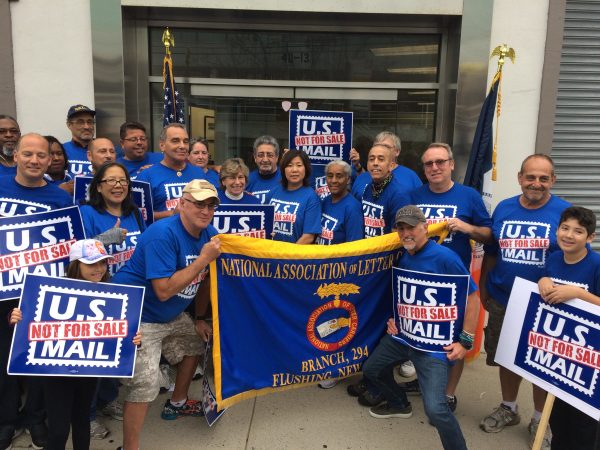
(Photo courtesy of Rep. Meng’s Office)
Oct. 9, 2018 By Tara Law
Queens postal workers condemned President Donald Trump’s proposal to privatize the U.S. Postal Service at a rally in Flushing on Monday.
Queens postal union members, U.S. Representative Grace Meng and local union presidents gathered in Flushing as part of the “U.S. Mail is Not for Sale” National Day of Action, a nation-wide protest. The Queens protesters, along with postal workers mobilizing across the country, took aim at President Trump’s proposal to privatize the agency.
The White House argues that the proposal, which was part of Trump’s “Delivering Government Solutions in the 21st Century” government reorganization plan from June, would cut costs and allow the agency to modernize.
The postal workers’ unions counter that privatizing U.S. mail would put postal workers’ jobs in jeopardy and drive up mail costs.
Gathered outside of Representative Meng’s office, Queens postal union leaders spoke about the potential impact of the proposal.
Tony Paolillo, president of the National Association of Letter Carriers Flushing Branch 294, called the Postal Service a “national treasure.”
“Service would be solely based on private gain, and would put millions of American jobs in jeopardy,” Paolillo said.
George Mangold, president of the New York State Association of Letter Carriers, noted that the Postal Service is part of the constitution. He called the agency a “service to the American people.”
“It was never meant to be a money making business,” Mangold said. “Privatization would destroy that service. The U.S. Mail is not for sale!”
Representative Meng had taken a stand against the president’s proposal in July, when she cosponsored a House resolution calling for Congress to block efforts to privatize the mail service.
On Monday, Meng said that the privatization would be “disastrous for our country.”
“The American people and small businesses rely heavily on the Postal Service and if the agency is privatized, we all stand to be socked with higher delivery costs and a reduction of service, particularity in areas where it’s not profitable for private companies to make deliveries,” Meng said. “Privatization may also put the jobs of our hard working postal employees on the chopping block.”


































